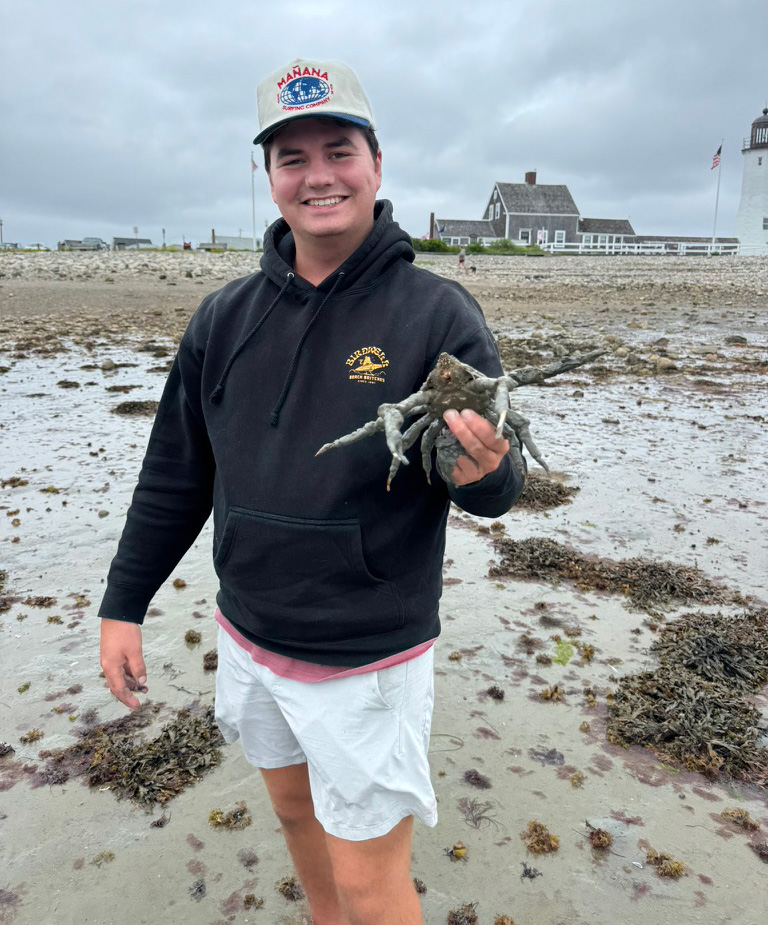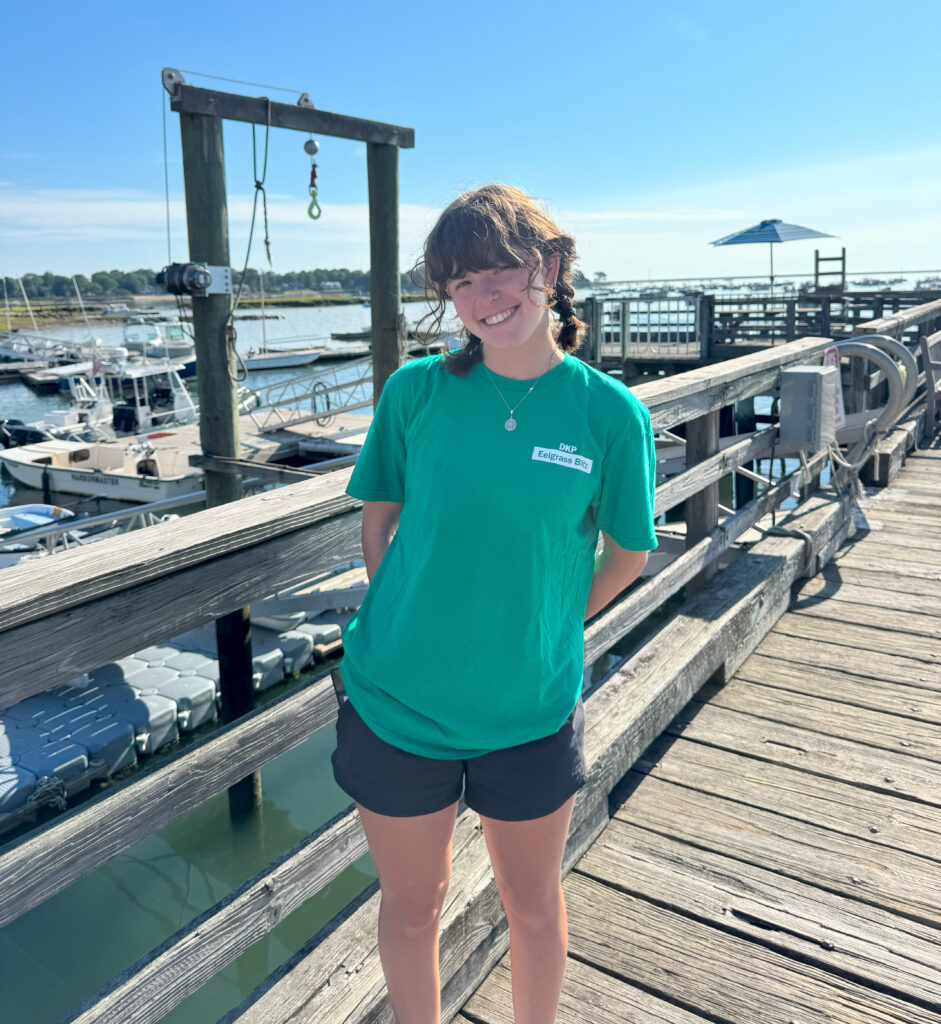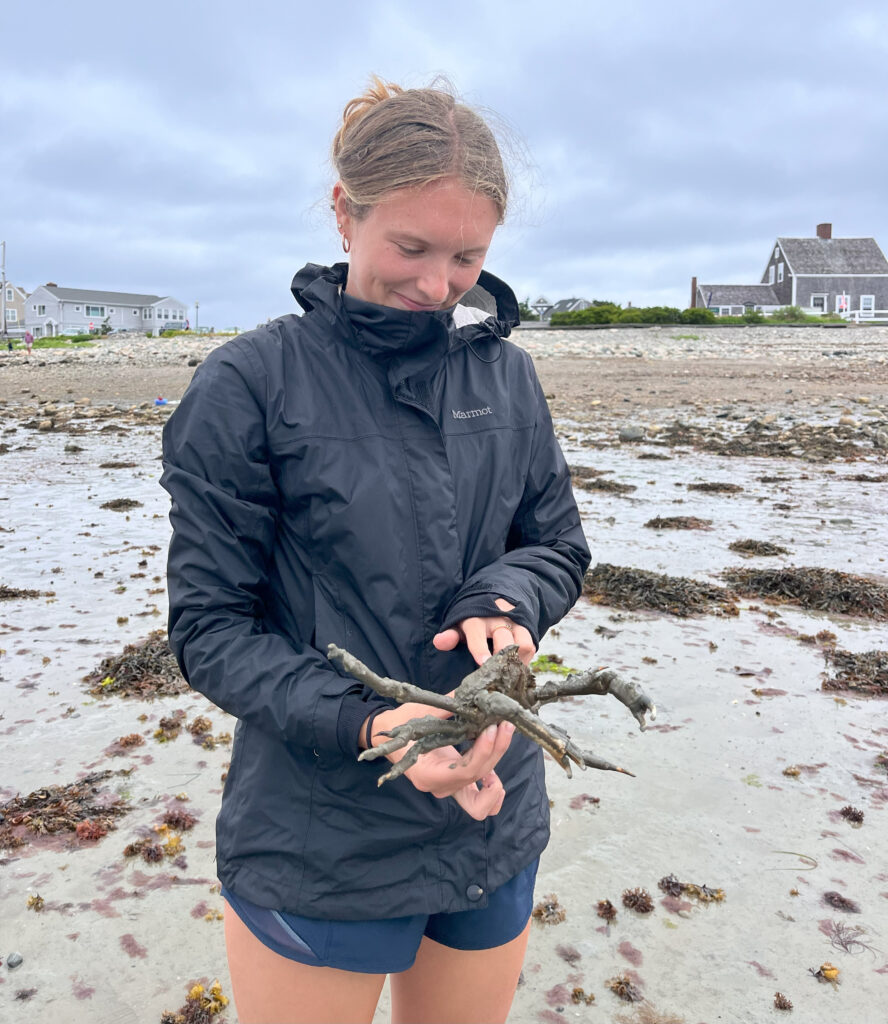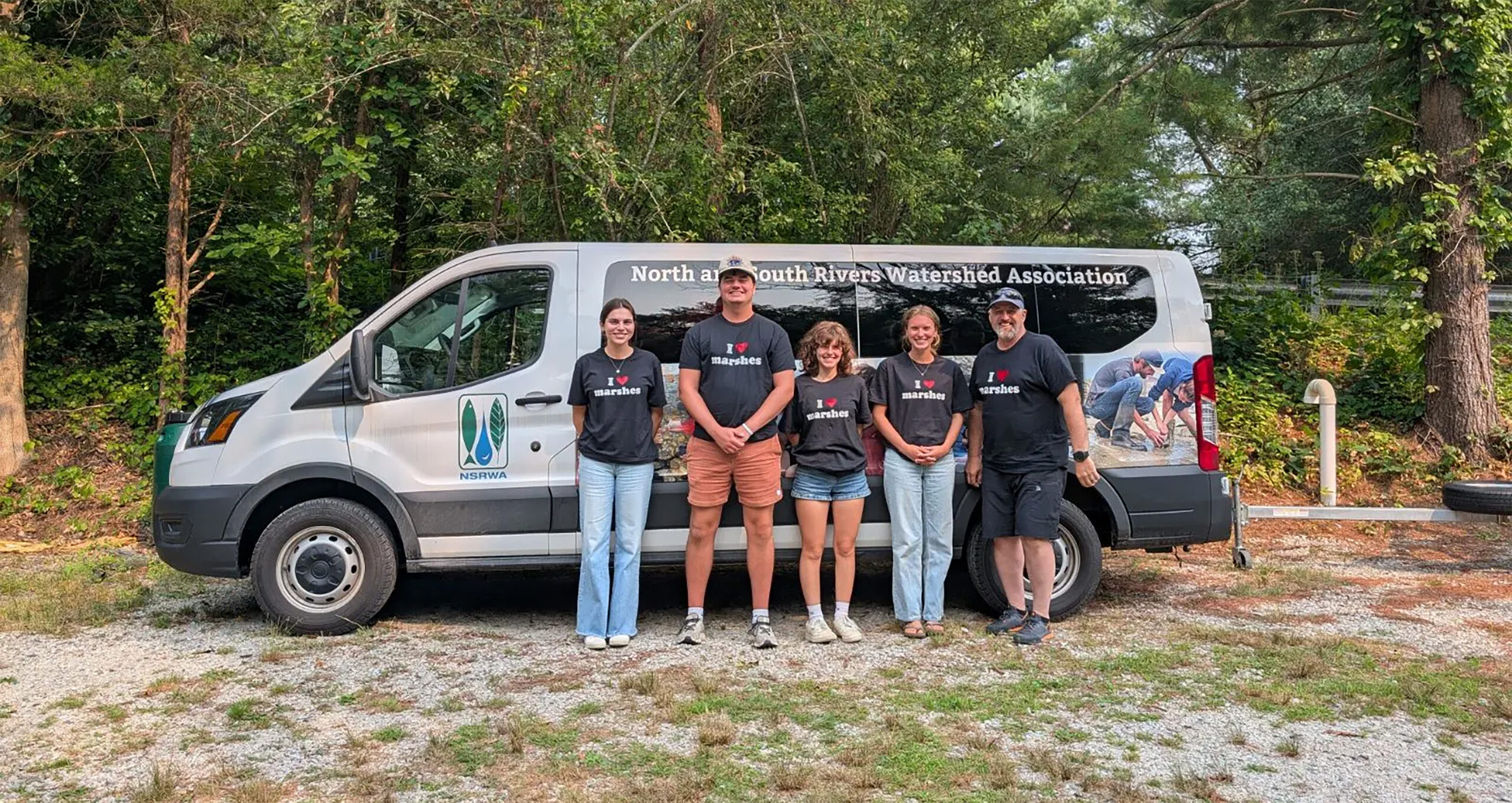
Thirteen weeks. That’s how long our summer internship runs. It appears to go by in the blink of an eye – until we stack up the mountain of work that was accomplished! This year we took our intern program to the next level. We added a fourth intern, and we created a new “senior intern” position. I have to start by thanking Avery Sands for helping develop this new position and being the first to fill it. Avery is back for her second year with NSRWA. With her knowledge of our programs and dedication to the work, she helped turn our 2025 team into a well-oiled machine that hit the ground running. And the rest of the team was so up for it!
Susanne Moore, Libby Cutler, and Sam Taylor brought their passion, energy, and big brains on day one. They wasted no time diving into the field work, data analysis, and all of the other things that make the summer our prime time. In just thirteen weeks this team analyzed all of our herring count and horseshoe crab data; intensively mapped a Scituate saltmarsh; conducted five rounds of RiverWatch sampling and analysis; conducted mussel surveys and both 3rd and 4th cliffs; monitored marine invasive species at four sites; conducted six eelgrass surveys in Duxbury and Plymouth; and hand-pulled invasive plants at two local sites. And that’s just the “ecology” work. They also supported our WaterSmart program, Striper Tournament, Great River Race planning, and a slew of other office support. While they were at it, they turned everything into amazing social media content. If you aren’t already following, please check out their work here https://www.instagram.com/cayacatnsrwa/ (and elsewhere). Thirteen weeks have flown by, but we have a mountain of results and a lifetime of memories to show for it. We can’t thank these four enough for all of their contributions.
As the summer comes to a close, I turn back to reflect on all the incredible moments and experiences I was able to participate in while interning at NSRWA.
My favorite memory over this past summer were the field days spent on the salt marsh. To learn about new equipment, while also getting a taste of the hard work that it takes to begin a restoration project, was really eye opening. Although this work was filled with mud, sweat, and even more mud, there was nowhere else I would rather be. Those days brought me back to when I was a child, exploring salt marshes near my home and becoming obsessed with every creature in sight. That same feeling floods back to me when I step foot on these beautiful ecosystems, and I hope to one day dedicate my career to their protection and restoration.
It is really hard to sum up this summer as it seemed to have truly flown by, yet it will be a summer I will never forget. Being able to see all of the amazing hard work that each and every one of the staff puts in to maintain the health of these beautiful local ecosystems was so inspiring. I especially want to thank both Alex and Sam for their amazing mentorship this summer. Alex’s guidance has pushed me to develop the scientific skills that are key to launching a successful career in science. Sam took the time to give me insightful real world teaching experiences about environmental consulting, an occupation that I wish to pursue in the future. Overall, this summer has been truly amazing, and I am so fortunate to have been given the opportunity to work alongside such amazing staff members and interns.
This summer has gone by far too quickly, and I feel so grateful to have been able to spend it working with the North and South Rivers Watershed Association.
Coming into this internship, I hoped to gain hands-on experience in local environmental conservation and develop practical field skills, but I didn’t anticipate the newfound sense of connection and purpose I would find in the process. Each day brought something new and unexpected, from early mornings trudging through salt marshes to emergency eel rescues. Additionally, working closely with local organizations and dedicated volunteers only strengthened my belief in the impact of community-driven environmental stewardship; it was inspiring. Though I have grown up on the South Shore, I have never felt more connected to my local environment and community than this summer. I had never even been on the North River until this summer, how wild is that!
A personal highlight of the internship for me was conducting the blue mussel surveys on both Third and Fourth Cliff. Being out on the rocks at sunrise and meticulously counting intertidal mussels brought back memories of my childhood explorations of the beaches. Being able to watch the steady growth of juvenile mussels and to contribute to research that supports the health of our coastal ecosystems made the work feel both meaningful and rewarding.
It’s difficult to find words that summarize how much this experience has meant to me. Working with such an inspiring group has truly deepened my appreciation for the natural world and the work that goes into protecting it. I’d also like to give a special thank you to Alex and Sam for their mentorship, wisdom, and support. Your encouragement and patience made every challenge feel like an opportunity to grow, and I’m so grateful to have learned from you both. Thank you to my fellow interns Avery, Libby, and Sam, as well as Beth, Lori, Brian, Claudia, Becky, Joe, Kezia, and all of the NSRWA staff and volunteers—each of you played a role in shaping this unforgettable experience, and I’ve learned so much from working alongside you. I’m incredibly thankful for the NSRWA team and the work they do; this summer will stay with me for a long time.
As my summer with NSRWA comes to a close, I have been able to reflect on my time here as an intern. Seeing how integral NSRWA is to the South Shore community was very inspiring, as the programs here are so interactive and far-reaching, it has been very rewarding to be a part of them. From RiverWatch monitoring to eelgrass surveys, we have been lucky enough to work with so many of the amazing citizen science volunteers to conduct important monitoring and research projects in the watershed.
My favorite part of this internship has been the mussel surveys, and all of our intertidal work, including marine invasive (MIMIC) surveys and salt marsh monitoring. Throughout our mussel surveys, I was shocked at the amount of mussels on Fourth and Third Cliff, and how unsteady this population has been in the past three or so years. Our mussel surveys aim to monitor these populations. During one of the surveys we had the opportunity to snorkel in order to see what predation occurs during mid-tide periods, when we usually would not be monitoring. We captured footage of hermit crabs and invasive green crabs eating mussels, which was really interesting to witness.
Having grown up in Scituate my whole life, it has been rewarding and eye opening to do so much monitoring work along the South Shore. Particularly, I enjoyed our lab work at Cohasset Center for Student Coastal Research (CCSCR), as I used to conduct research there as a student for multiple summers in high school. In addition, conducting mussel surveys on Fourth Cliff was amazing because I had never been there before, and now I know so much about the ecosystem on that stretch of land.
I feel so grateful to have spent the summer working in the places and ecosystems that made me love nature and want to study environmental studies! A special thank you to Alex Mansfield and Samantha Woods for allowing me to be part of this wonderful organization and providing lots of guidance throughout the summer, and to my fellow interns, Susanne, Avery, and Sam, as well as Lori, Claudia, Becky, Joe, Beth, Kezia, Brian, and all of the NSRWA staff and volunteers.
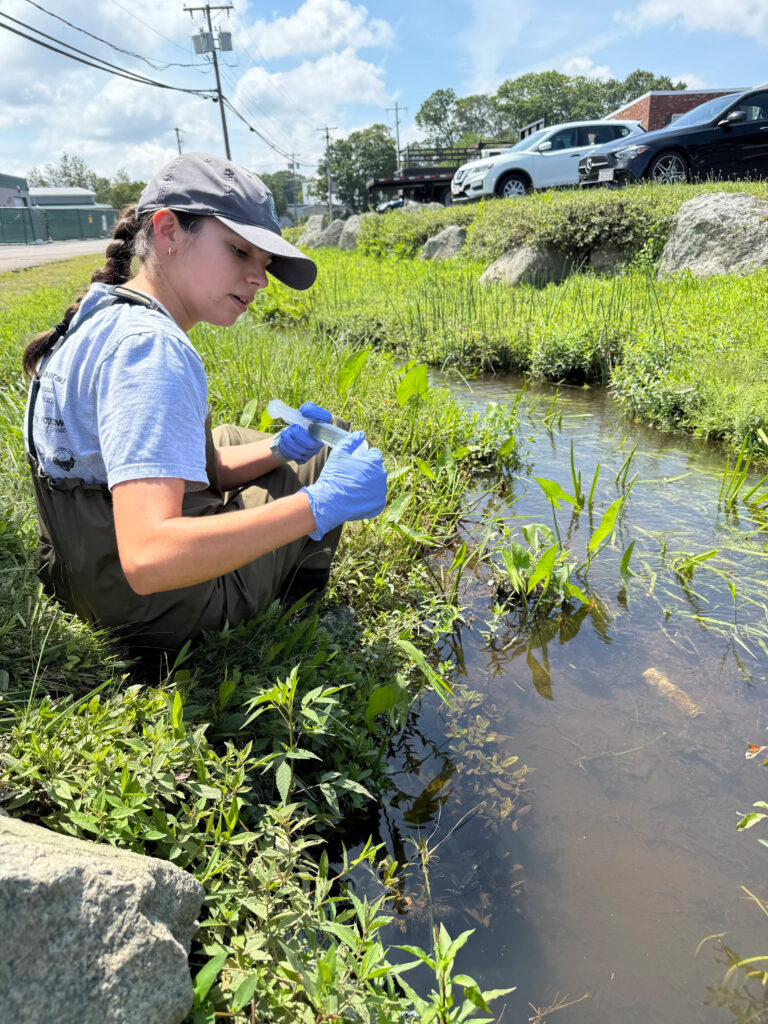
Avery Sands
I was thrilled to have the opportunity to work at the North and South Rivers Watershed Association for a second summer. Giving back to the community that fostered my appreciation for environmental science was an incredible experience. I feel so lucky to have been part of a team assisting with local conservation efforts to protect our watershed.
We jumped right into the summer working on a wide range of monitoring and surveying projects across the South Shore. Each day in the field provided so many new and meaningful experiences. At a time when environmental efforts are at risk, it was reassuring to see how our work creates hope for the future and promotes the protection of local ecosystems. For example, despite a drastic population reduction earlier this year, our blue mussel surveys on 4th Cliff yielded the discovery of millions of juvenile mussels along the cobble shore. While salt marshes face threats from rising sea levels, our delineation and elevation mapping of the Scituate Driftway marsh are encouraging steps for future remediation projects. During our surveys to identify the presence of invasive species on our local docks and beaches, we were excited to find countless native rock crabs, sea stars, and sea anemones. Culverts and dams may impede the natural function of our rivers and streams, but our assessment and restoration efforts demonstrate that herring, pickerel, and brook trout may thrive in these environments once again.
As I enter my senior year at Trinity College, I’m confident that I will utilize the valuable skills I learned working with the NSRWA. This includes report writing, citizen science collaboration, project planning and implementation, and the impact of local policy. I’d especially like to thank Alex and Samantha, the intern team: Susanne, Libby, and Sam, as well as Lori, Claudia, Becky, Joe, Beth, Kezia, Brian, and all of the NSRWA staff and volunteers. I look forward to staying involved with the NSRWA next summer and beyond!
Watch the 2025 NSRWA Summer Intern bloopers.

